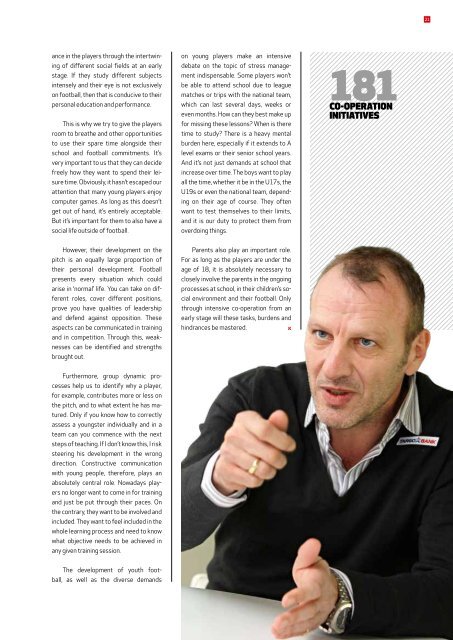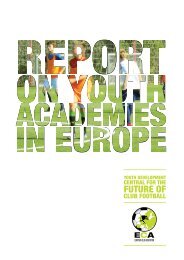10 Years Of German Academy Training.pdf
- No tags were found...
Create successful ePaper yourself
Turn your PDF publications into a flip-book with our unique Google optimized e-Paper software.
21<br />
ance in the players through the intertwining<br />
of different social fields at an early<br />
stage. If they study different subjects<br />
intensely and their eye is not exclusively<br />
on football, then that is conducive to their<br />
personal education and performance.<br />
This is why we try to give the players<br />
room to breathe and other opportunities<br />
to use their spare time alongside their<br />
school and football commitments. It’s<br />
very important to us that they can decide<br />
freely how they want to spend their leisure<br />
time. Obviously, it hasn’t escaped our<br />
attention that many young players enjoy<br />
computer games. As long as this doesn’t<br />
get out of hand, it’s entirely acceptable.<br />
But it’s important for them to also have a<br />
social life outside of football.<br />
on young players make an intensive<br />
debate on the topic of stress management<br />
indispensable. Some players won’t<br />
be able to attend school due to league<br />
matches or trips with the national team,<br />
which can last several days, weeks or<br />
even months. How can they best make up<br />
for missing these lessons? When is there<br />
time to study? There is a heavy mental<br />
burden here, especially if it extends to A<br />
level exams or their senior school years.<br />
And it’s not just demands at school that<br />
increase over time. The boys want to play<br />
all the time, whether it be in the U17s, the<br />
U19s or even the national team, depending<br />
on their age of course. They often<br />
want to test themselves to their limits,<br />
and it is our duty to protect them from<br />
overdoing things.<br />
181<br />
co-operation<br />
initiatives<br />
However, their development on the<br />
pitch is an equally large proportion of<br />
their personal development. Football<br />
presents every situation which could<br />
arise in ‘normal’ life. You can take on different<br />
roles, cover different positions,<br />
prove you have qualities of leadership<br />
and defend against opposition. These<br />
aspects can be communicated in training<br />
and in competition. Through this, weaknesses<br />
can be identified and strengths<br />
brought out.<br />
Parents also play an important role.<br />
For as long as the players are under the<br />
age of 18, it is absolutely necessary to<br />
closely involve the parents in the ongoing<br />
processes at school, in their children’s social<br />
environment and their football. Only<br />
through intensive co-operation from an<br />
early stage will these tasks, burdens and<br />
hindrances be mastered.<br />
Furthermore, group dynamic processes<br />
help us to identify why a player,<br />
for example, contributes more or less on<br />
the pitch, and to what extent he has matured.<br />
Only if you know how to correctly<br />
assess a youngster individually and in a<br />
team can you commence with the next<br />
steps of teaching. If I don’t know this, I risk<br />
steering his development in the wrong<br />
direction. Constructive communication<br />
with young people, therefore, plays an<br />
absolutely central role. Nowadays players<br />
no longer want to come in for training<br />
and just be put through their paces. On<br />
the contrary, they want to be involved and<br />
included. They want to feel included in the<br />
whole learning process and need to know<br />
what objective needs to be achieved in<br />
any given training session.<br />
The development of youth football,<br />
as well as the diverse demands




